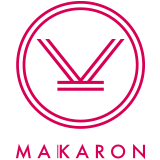CRS & brand ethics
MAKARON is committed to a standard of excellence in every aspect of its business, including legal, ethical and responsible conduct in all of its operations.
Factories, suppliers and agents affiliated with the manufacturing of MAKARON goods share the same commitments, including high quality standards set by the founder of the brand.
From sourcing to retail, MAKARON is involved in a high quality product delivered to the consumer:
- Sourcing: using the highest-quality fabrics and materials to deliver the best possible products to our customers.
- Long-term relationships with suppliers.
- Employment ethics: respect of working hours, no child labor, no forced labor, respect of health & safety rules and environment.
- High standard of quality control: the team strictly controls each stage of the production process.
- Point of sale: regular communication and follow up with retailers in respect of the Makaron brand image and price range.
Environmental Responsibility
MAKARON believes it is important to take responsibility for the environment by selecting materials and way of transportation carefully. Our goal is to lower our environmental impact, and since our customers decide the way of transportation we try to guide them to better options.
Environmental thinking should be a natural part of everyday activity. All employees must be aware of the MAKARON policy and be given basic environmental training during their induction, while the training of key individuals will be more extensive.
Our suppliers must have clear environmental programs, careful selection of materials and consideration of these requirements at the time when new products are being developed. If any suppliers should not follow our code, the cooperation will be examined and actions taken accordingly.
Leather Free Brand
As a vegetarian brand, we don’t use leather, using alternative materials instead.In 2013, when launching our first collection of accessories, we had doubts about not using leather. Even if we don’t use leather, we can make products that are beautiful, sustainable and cruelty-free.
Impacts of using leather are the land use and greenhouse gas emissions associated with animal rearing. Other important impacts are energy use and water requirements of tanneries as well as water pollution resulting from chemicals used in the tanning process. Although our decision to avoid leather enables us to have a lower environmental impact than those that do choose to use leather, we openly acknowledge that the synthetic alternatives are not without concern (the most damaging impact of polyester production is the extraction and processing of oil into yarn). So we try to use recycled nylon and polyester whenever it is possible.
